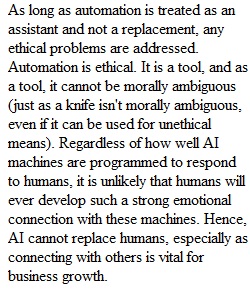


Q One these of this class is the changing landscape of operations management due to technology. The following article is a few years old, but it is the best example that I have found for how to put the future of automation and jobs into perspective. Please read it before making a post. Is your job an endangered species (WSJ).pdf The following is an open-ended discussion and is meant to explore and expand on the ethical aspects of applying automation in services. Some starter ideas: • Is it always acceptable to displace humans with machines? • Issues of alignment with customers (this is both a pro and con) • What is a company's responsibility to displaced workers? • What happens to the long-term workforce? You are not required to comment on all of these points and are free to include more points of your own.
View Related Questions